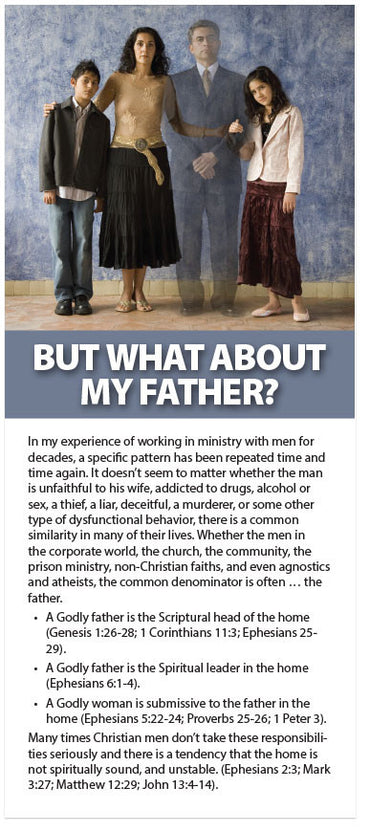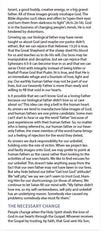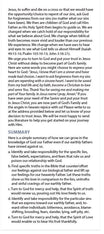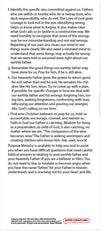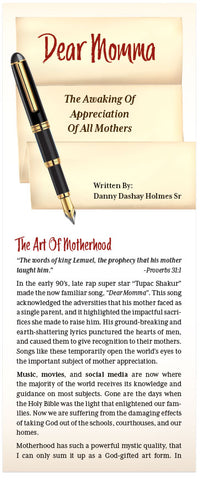But What About My Father? (NIV)
Special-Order Folded Flyer Tract
 NOTE: This item is custom-printed to order (click for more details).
NOTE: This item is custom-printed to order (click for more details).
This tract is from our print-on-demand library, and is not kept in stock. Select the options below, and we will custom-print a batch just for you. Because this item is custom-printed, you can add your custom imprint to the back page at no extra cost.
- Estimated shipping date: Thursday, January 29 (Click for more details)
- SKU:
- Discounts: Discount coupons do not apply to this item
- Format: Folded Flyer Tract
- Size: 3.66 x 8.5 inches
- Pages: 6
- Imprinting: Available with 5 lines of custom text
- Version: NIV
- Returns: Because this item is custom-printed to order, it cannot be returned.
Show all item details
The full text of this flyer tract is shown below in the NIV version. (Do you want to print this tract in a different version than the one listed? Contact us and let us know what you're looking for—we may be able to create the alternate version for you at no charge.)
In my experience of working in ministry with men for decades, a specific pattern has been repeated time and time again. It doesn’t seem to matter whether the man is unfaithful to his wife, addicted to drugs, alcohol or sex, a thief, a liar, deceitful, a murderer, or some other type of dysfunctional behavior, there is a common similarity in many of their lives. Whether the men in the corporate world, the church, the community, the prison ministry, non-Christian faiths, and even agnostics and atheists, the common denominator is often … the father.
A Godly father is the Scriptural head of the home (Genesis 1:26-28; 1 Corinthians 11:3; Ephesians 25-29).
A Godly father is the Spiritual leader in the home (Ephesians 6:1-4).
A Godly woman is submissive to the father in the home (Ephesians 5:22-24; Proverbs 25-26; 1 Peter 3).
Many times Christian men don’t take these responsibilities seriously and there is a tendency that the home is not spiritually sound, and unstable. (Ephesians 2:3; Mark 3:27; Matthew 12:29; John 13:4-14).
BAD EXAMPLES FROM EARTHLY FATHERS
I’ve seen men totally destroyed for a lifetime because of the physical absence of a father in the home. The father is addicted to something in every single case; addicted to a career, a drug, sex, money, TV, evilness, pride, and a trail of suffering young people have just gone through a childhood and their teens without a father figure to help guide them. For many years I attended little league baseball games for my own children and grand children. Most often the other boys on the team played sports for years without their father ever witnessing their efforts.
Once an individual realizes that their father doesn’t care enough or isn’t there for them it is most difficult for these young boys to accept any form of a father. They may not even be able to say the word “father” without some feeling of frustration or resentment. They may not even want to hear the word “father” spoken in their presence. Some grown men can’t even speak the “father” word without becoming angry and sick to their stomach, remembering their earthly father and the empty void that probably still exists.
If your father was abusive, demanding, critical, neglectful, selfish, or not in your life, are you crippled from knowing God as a loving Father? Must you first experience a corrective human relationship in order to make “God as my Father” a nourishing reality?
The answer to these questions is “No!” It is understandable to think that if you had a rotten parent, then God must be rotten too. Men often have their view of God twisted because of sinful parents, or for some other reason. Are there any people with bad parents who have a great relationship with God? Are there any people with good parents who have a rotten view of God?
BAD EXAMPLES FROM OTHERS
God has many roles and titles, such as King Shepherd, Master, Savior, and Lord. In the normal course of life we find that sinful human fathers are not unique in misrepresenting God.
God is King: Human rulers are frequently remote, tyrannical, or corrupt. To whom on earth we look for examples of what God the King is like? God-imaging rulers have always been decidedly rare. Does our experience of figureheads, politicians, or tyrants, cripple us from knowing God as King? It doesn’t have to. God Himself informs us about bad kings, mediocre kings, and good kings so we can learn to tell the difference. He tells us about the just and the unjust, the fair and the unfair, the consistent and the erratic. We must allow God’s Word to dictate our understanding of God. When man places his hopes in a human being as the only source to spiritual well-being, and doesn’t let God lead and guide, there can be tragic spiritual results.
God is our Shepherd: What if real-life shepherds generally provide us questionable examples? What if the real-life shepherds we know are ignorant know-nothings or drunken drifters? Consider also the shepherds of God’s flock whom we have known. Some of us can point with joy to a “Godly pastor who made such an impact on my life.” But other people grew up under false teachers: greedy, willful, arrogant and careless men (Ezekiel 24). Does this mean that you can gain no comfort from the fact that the Lord is a Shepherd until we have the corrective experience of knowing a Godly pastor? Ezekiel 34 (and John 10) tell us the opposite. God assumes that we can hear comfort straight from Him even if people have betrayed our trust: “I am against these evil shepherds, and I, the good shepherd will myself come and take care of you, my flock.” Will we believe our experience of sinful men, or will the truth of God remake our experience? We must get first things first.
God is our Master: How do we typically experience authority figures such as bosses, supervisors, commanding officers, CEO’s, and managers? Often there is an estrangement, rivalry, manipulation, and suspiciousness between masters and those who work for them. God chose such a negative word, “Master,” to portray Himself. But those of us who have associated the word “master” with negative experiences are liberated once we grasp the point of what “Master” means in the context of God.
God is our Savior (Rescuer and Helper): Only God is all-powerful and able to do the miraculous things we ask of Him. He forgives, He guides, and He loves us no matter who we are or what we’ve done. He will listen to us, He will save us from our sins, He will welcome us to His eternal home (heaven) if we are part of His family. We don’t depend on earthly “Saviors” with suspect motives who want to control or dismantle us with the games they play. God is able to reveal Himself as totally God without godly people getting in the way.
BUT GOD IS OUR FATHER?
Typically, people look at God in a variety of ways. God may be to some a higher power, an idol, a remote tyrant, a good buddy, creative energy, or a big grandfather. All of these images grossly misshape God. The Bible disputes such ideas and offers to “open their eyes and turn them from darkness to light” (Acts 26:18). God is in the business of changing people’s minds. He is not hindered by distortions.
Growing up, our biological father may have never taught us about God (and maybe our pastor didn’t, either). But we can rejoice that Hebrews 13:20 is true, that the Great Shepherd of the sheep shed His blood for us and teaches us to do His will. Our boss may be manipulative and deceptive, but we can rejoice that Ephesians 6:5-8 can become true in us and that we can serve Christ with integrity instead of being bitter or fearful! Praise God that Psalm 36 is true, and that He is an immediate refuge and a fountain of love, light and joy. Our earthly human father may not be part of our lives, but our heavenly Father is more than ready and willing to fill that void in our hearts.
Is it possible that we can’t know God as a loving Father because our biological father didn’t love us or care about us? This idea can ring a bell in the human heart. As sinners we tend to manufacture false images of God, and human fathers are one prime candidate. Some men can’t start to hear or say the word “father” because of past experiences with their human father. So, no matter who is being referred to, our human father or our heavenly Father, the mere mention of the word/name brings out a feeling of rejection for the word they detest.
As sinners we duck responsibility for our unbelief, holding onto the role of victim. When we project lies and faulty images onto God, we may prefer to point at human fathers as the cause rather than looking to the activities of our own hearts. We like to find excuses for our unbelief. This doesn’t take anything away from the fact that our own father may not have been in our lives. But why hide behind our bitter “Get lost God” attitude? We “self pity,” we say we can’t seem to trust God, blaming Him for our shortcomings (or those of others). We continue to let Satan fill our mind with, “My father didn’t love me, so my self-centeredness, self-pity and unbelief has an underlying reason. Somebody else caused my problems; somebody else must fix them.”
THE NECESSARY CHANGE
People change when the Holy Spirit sheds the love of God in our hearts through the Gospel. Whoever receives the Gospel by trusting, by faith, that God sent His Son, Jesus, to suffer and die on a cross so that we would have the opportunity/choice to repent of our sins, ask God for forgiveness from our sins (no matter what our sins have been). We then are children of God and call Him Father as His Holy Spirit then begins to guide us. We are changed when we catch hold of our responsibility for what we believe about God. We change when biblical truth becomes more vivid and louder than our previous life experience. We change when we have ears to hear and eyes to see what God tells us about Himself (Isaiah 49:13-16; Psalm 103:10-13; John 3:16-21).
We urge you to turn to God and put your trust in Jesus Christ without delay to become part of God’s family. Here are some words you might choose to express your heart to God: “Jesus, I know that I am a sinner and have made bad choices. I want to ask forgiveness from my sins and am repenting with a sincere heart. I want to be saved from my bad life and, by faith, become a Christian to love and serve You. Thank You for saving me and making me part of Your family. In Jesus name I pray, Amen.” If you have seen your need of the Savior and put your trust in Jesus Christ, you are now part of God’s Family and the angels in heaven rejoice with us! Please write to us at the address provided below and let us know of your decision to trust Jesus. We will be most happy to send you literature to help you get started on your journey with Him.
SUMMARY
Here is a simple summary of how we can grow in the knowledge of God our Father even if our earthly fathers have sinned against us.
a. Identify and take responsibility for the specific lies, false beliefs, expectations, and fears that rule us and poison our relationship with God.
b. Find specific truths in the Bible that counter/offset our feelings against our biological father and lift up our feelings for our heavenly Father. Let these truths show us His love in comparison to the lies, untruths and sinful cravings of our earthly father.
c. Turn to God for mercy and help, that the Spirit of truth would renew us, pouring out His love freely to us.
d. Identify and take responsibility for the particular sins that we express toward our earthly father, and, toward other individuals: bitterness, avoidance, blame-shifting, brooding, fears, slander, lying, self-pity, etc.
e. Turn to God for mercy and help, that the Spirit of Love would enable us to bear His fruit thankfully.
f. Identify the specific sins committed against us. Fathers who are selfish or hostile, who lie or betray trust, who duck responsibility, who do evil. The Love of God gives courage to look evil in the eye. Identifying wrong helps us know what to forgive. It also makes clear what God calls us to tackle in a constructive way. We need humility to recognize that some of the wrongs may be our misunderstanding and not real wrongs. Repenting of our own sins clears our mind to see things more clearly. We also need a renewed mind to understand that some things may actually be wrong that we were told or assumed were right about our earthly father.
g. Remember the good things our earthly father may have done for us. Pray for him, if he is still alive.
h. Our heavenly Father gives the power to return good for evil rather than evil for evil. He remakes His children like His Son, Jesus. Try to come up with a plan, if possible, for specific changes in how we deal with our earthly father and his wrongs: forgiving him, loving him, seeking forgiveness, confronting with love, refocusing our attention and pouring our energies into God’s calling on our lives.
i. Find wise Christian believers to pray for us, hold us accountable, encourage, counsel, and mentor us. Faith in God our Father is catching. Wisdom for living as a peacemaker, as child of God, is also catching, no matter where we are. “The compassion of the wise becomes wise.” The Father is seeking worshipers and creating children who know Him. Ask, seek, knock!
Purpose Ministry is available to help you and to assist you when you have difficult questions that need careful biblical answers in relating to your earthly father and your heavenly Father (if you are a believer in Him). You do not need to fear or hesitate or become angry when you hear the name “father,” for your Father in heaven understands and is reaching out for your heart and life.

